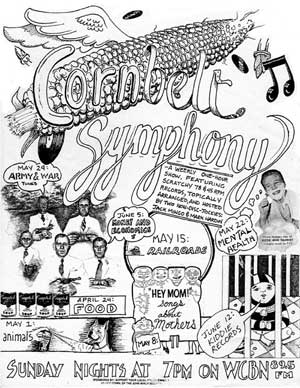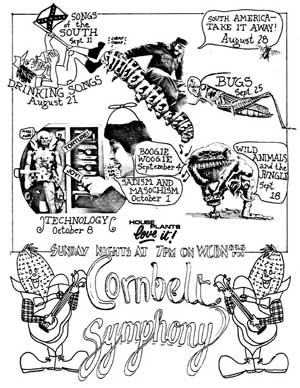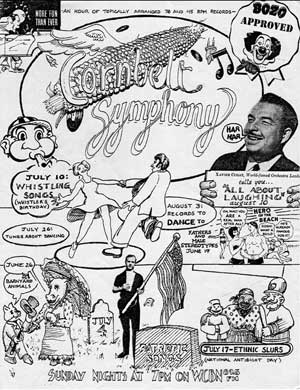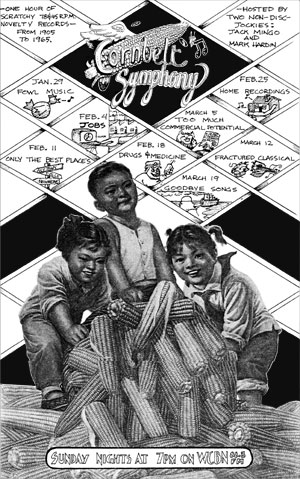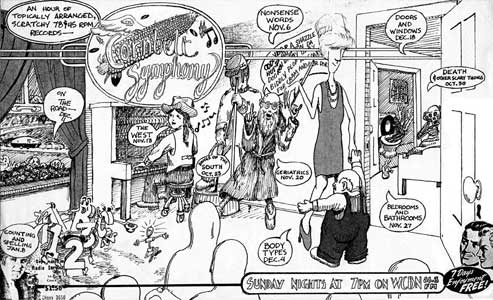T
he short-lived "Cornbelt Symphony" radio show on Ann Arbor, Michigan's WCBN-FM ran for just over a year, from early 1977 to March or April 1978 (plus a few New Year's Eve shows in succeeding years).
Around 1974, friends Jack Mingo and Mark Hardin started collecting records and recordings of all speeds, but mainly 78RPM discs. 90% of what we were interested in had nothing to do with the popular music of any period, nor what were always acknowledged as the "great" bands, musicians or composers. Rather, we were, from the beginning, amazed by and fascinated with the range of pure sociological crap available on recordings, showing the ideas and mores of the 20th Century - often in more excruciating detail than any books or movies of the period. As such, we collected a lot of vocals, spoken-word recordings, oddball instrumentations, and anything with a strange-sounding title. These were often what were called "novelty" records, the "B" sides of hit tunes, and so on.
Everything collected by one of us would be recorded to cassette tape and mailed off to the other. And pretty much from the get-go, topics would be clustered on these tapes, or arranged in sequences. For instance, songs about kids/candy/toys, or illnesses/medicines/doctors would all follow one another. After a couple years of this, we realized "hey, we probably have a whole hour's worth of "COFFEE" songs alone!", and more and more topics like this came to us.
Our friend Dan Gunning got wind of some of our tapes, and suggested he could introduce us to the mainstays at Ann Arbor's college station, WCBN-FM. We were given the perfect slot for us: a one-hour period starting at 7PM on Sunday evenings.
We'd select some topics we thought we could cover, maybe enough subjects for eight to ten shows. Then each of us would manually go through our entire collection: 78s, 45s, 33 1/3, everything, to see if any songs fell into any of those categories we had lined up. These piles of records would be toted into the studio each Sunday, in bags, boxes and suitcases, and we'd try to arrange the subtopics we had with us into a show — sometimes in a few spare moments, sometimes on-the-fly if we'd barely arrived to the studio on time. Combine that level of spontaneity with the fact that we would often have too many records to fit in an hour (or we'd want to play only the "good" part of a vocal track that might last only for a verse or two). As a result, we’d sometimes be changing records several times a minute. This involved more than just picking up one disk and slapping down another— it often entailed changing the speed of the turntable and replacing the stylus, since the 78s had to be played with a wider needle than the 33s and 45s. This made for constant commotion, lots of immediate decisions, and quite a mess, with widely scattered records constantly moving from various semi-sorted piles to one of the two turntables to the “already played" pile. We now wish we’d taken videos of our frenetic juggling act, so you could see why we sometimes sound slightly frazzled when we came back on the air to recap our playlist to both our listeners!
We'd occasionally look up from the mess we'd made, to discover that we had curious onlookers peering in the windows of the studio. Eventually they were standing in the room watching and laughing with us, passing joints around and generally *cough* "helping" the show along.
To our knowledge, there was no means for directly recording show log files at WCBN at the time. So the soundfiles here are all derived from audio cassettes recorded off-the-air by girlfriends or friends, on whatever tapes and whatever boomboxes or the like were available. Quite a few of the shows never got recorded at all, some were dubbed over when no other tape was available, some one-hour tapes never got flipped-over at the half-hour mark (or there's a huge gap at that point!)
That's why what you have here is: scratchy records, in whatever condition we found them, broadcast over a college station, recorded off-the-air on cheap machines using cheap cassettes, stored for 35 years, then ripped to an mp3 file with almost no audio filtering or other post-processing: you get the picture!
Mark's notes:
These tapes are tough for me to listen to now: we were so inexperienced and self-conscious on-air, and we were only beginning to learn a bit about musical history at that time.
I remember calling Ann Arbor's eminent jazz historian Hazen Schumacher, asking for some occasional educational info and consultation. He spoke with me, but was aware of our lowbrow show and held it in considerable disdain, refusing any assistance whatsoever!
During the course of the year's recordings I can hear myself experimenting with several "voices", until we were finally at ease. Jack and I tried to be "cool" and humorous, but rather than coming off as Bob & Ray, we ended up much closer to Beavis and Butthead.
Jack was also the more active collector by far; his contributions to the show were sometimes as much as twice my own. Nevertheless, I
remember my tendency to occasionally hog the mike, and to give my own discs preferential airtime...all embarrassing now!
Despite cringing when I hear my own voice, in listening to the tapes after all these years I'm really pleased with most of the stuff we played! For a couple of guys who were self-educated goofballs in this field, the music on these shows is still fun listening for me.
In these days when all data is digitized and even the most obscure artists can be accessed instantaneously, and when anyone can create their own audio collages on their laptops or iThings, it's easy to forget how difficult it once was to assemble the fun, oddball crap we played!
Jack's notes:
I have so many great Cornbelt memories, but the thing that stands out most was the gut-wrenching frenetic energy that began as we cued up our theme song. We were such novices that we didn't know about radio stations' broadcast tape cartridges, so we actually brought the fragile 78 RPM records of the "Cornbelt Symphony" to the studio each week instead of sensibly pre-recording our opening / closing music!
The worst part was that when a segment of music ended, we had to talk! I suffered from terrible mic fright at the beginning, often shutting up and hoping Mark would fill the space until the next record. Weirdly, that changed during our "Trains" show, when I showed up to the studio with a bloodied, bent and untreated broken arm from a bad skateboard tumble. Besides being in a lot of pain, I eventually realized that my mic fright was gone and (probably from my body’s natural painkillers) I was feeling very relaxed. Afterward, Hardin drove me to the emergency room, and from then on it felt as if I had broken my mic terror cycle.
One more memory: Some kid who would call after every freaking show to ask why we didn’t play some relevant song, usually by Fats Waller. Finally, we said, “Here’s the list of our next six shows' topics. If you have something pertinent, bring it in and maybe we’ll give you a few minutes to introduce and play it.” The next week, he called our bluff and arrived at the studio with a record under his arm. He said to introduce him as “Arwulf,” which we did. He became a regular presence in the studio, and his taste in music wasn’t half bad. I wonder whatever happened to the guy?


